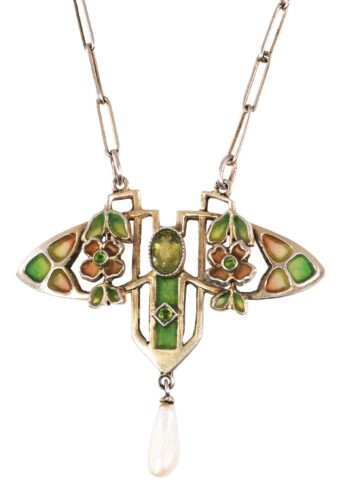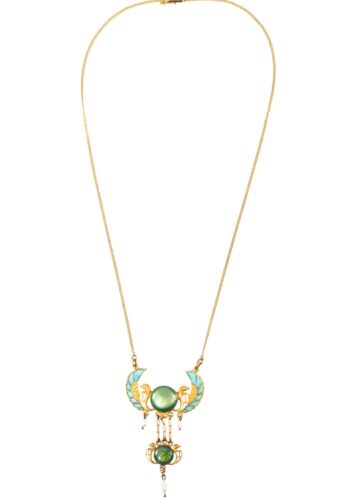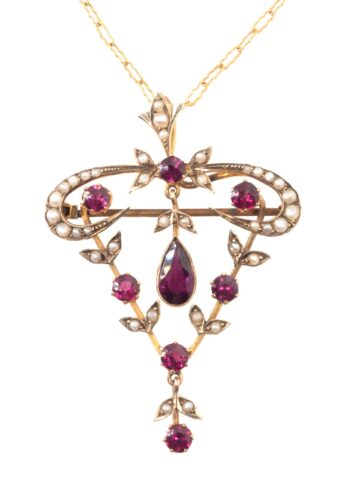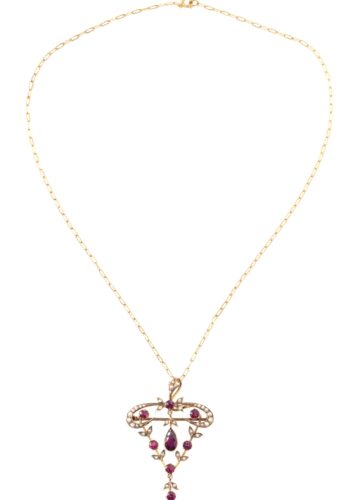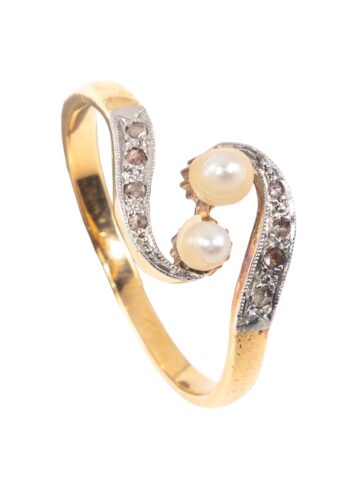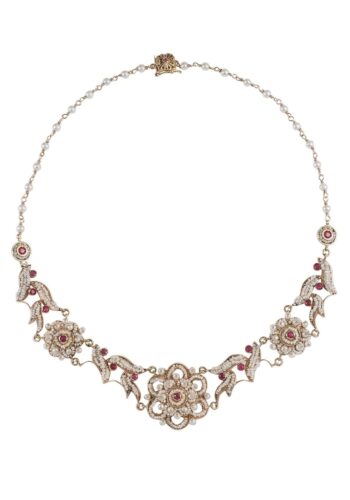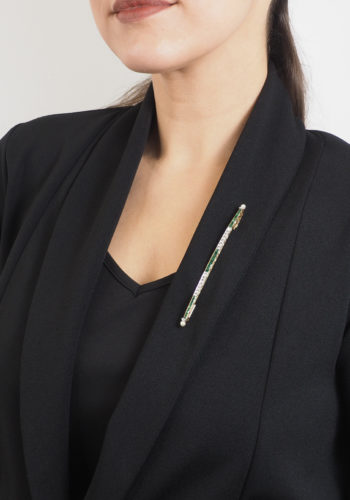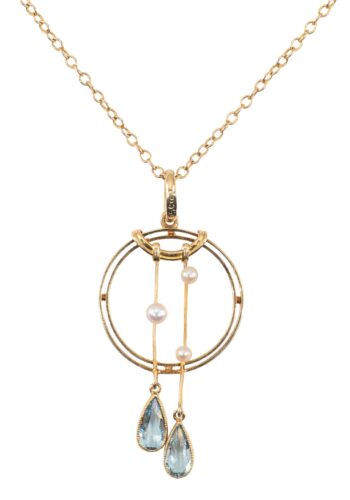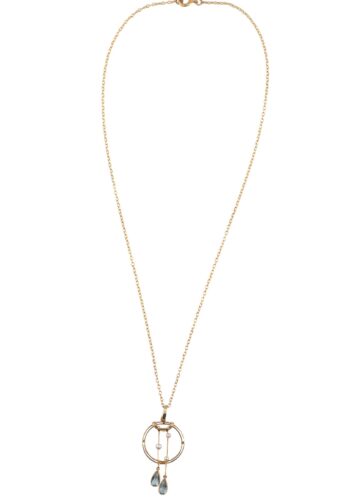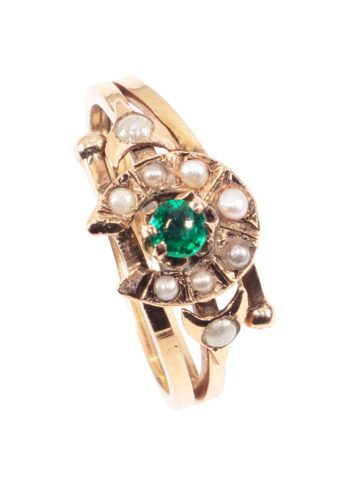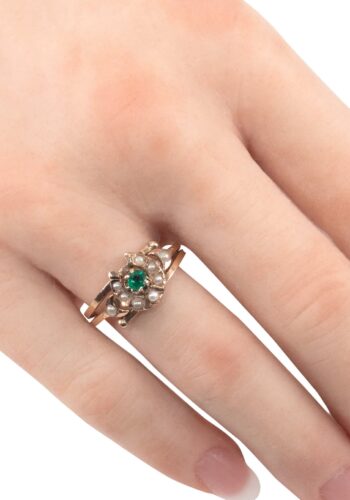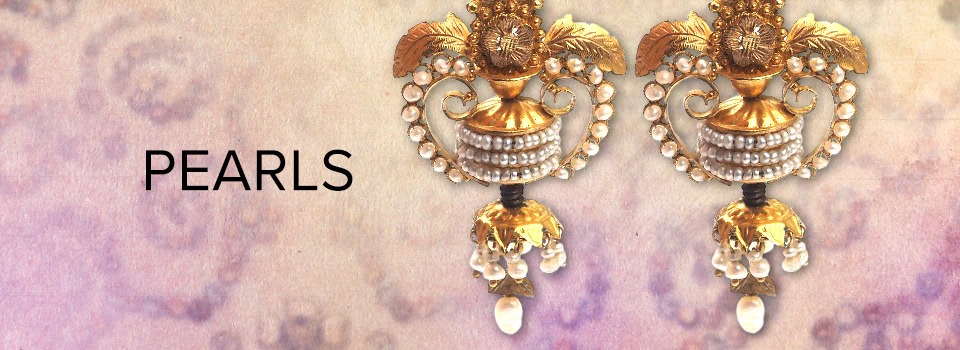
Pearls
Coral
Since the Georgian epoch, particularly the red Mediterranean coral has been applied for antique coral jewellery in Europe. The fascination, which emits this natural product, is significant. Besides the pearl, nearly just the coral jewellery satisfies the wishes and needs of the lovers of organic jewellery. The more or less intensive red of the natural material offered a wide range of expression possibilities to the artists of central Europe in the 19th century. Until into the Art déco coral jewellery was still to be acquired new through the general availability of the material. This changed in the 1940s partially when the corals almost became extinct in the Mediterranean Sea. The spreading and popularity of the red coral, set in gold or gilt silver, was at this point already exceptionally large. These works of Italian jewellery manufacturing were often taken as souvenirs to all parts of Europe and the world. Either the widely travelled lady wore her Mediterranean coral jewellery herself or it was granted to the loved ones. Marvellous earrings, brooches and bracelets with this natural product functions as eye-catcher and thus, generate a certain wanderlust. It is known that the origin of such beauties lies in the Mediterranean climate of the European south mostly associated with rest and holiday joys. The coral is skilfully carved and polished by hand. Very filigree cameo carvings with the simulacrum of gods and scholars adorn earrings and brooches. As cabochons they also enthuse on earrings and pulled on chains. Healing powers, radiated by the coral, as it is awarded as well to amber by conviction, were used by hanging it around children’ necks against teething problems.Pearls
The fascination pearl is as old as mankind. Pearls are not only a miracle of nature – they are triggers of emotions like charm and desire. Pearls inspire the imagination of mankind since centuries. Artists, jewellery creators and fashion designers have always found complete expression and integrate pearls into their works or create their works round the pearl. Such a beauty and preciousness arise from a mussel, a living being. Though this can be explained biologically, but rationally it is hard to understand. The classical pearl with its beaming white is a symbol for the cleanness and virginity. Already more than 7000 years ago, people were diving for pearls, as has been proved, in the Arabian region. It is difficult to imagine that except gold another jewellery material has such an attracting effect on people as the pearl. The flawlessly round and optically perfect pearls are most likely cultured pearls. When breeding, the natural process of the growth of a pearl is stimulated inside of the oyster by implanting a core. Cultured pearls are therefore also ‚real‘ pearls and are qualitatively not inferior to natural pearls! Their natural production process is just only controlled and not left to the chance. Whether an oyster carries a natural pearl in itself and of which size, colour and form it will be, is in its unpredictability one of the mysteries which makes this product so fascinating. For antique pearl jewellery natural pearls mostly were used. These are always unique in their colour and form. Not seldom a natural pearl was used as a solitary eye-catcher and the ring, the pendant or the brooch was properly forged ‚all around‘ it. Nevertheless, long rowed pearl chains were designed mostly with cultured pearls because their attractive evenness fulfilled most likely the harmonious demands. Incredibly stunning pearl chains were worn by incredibly stunning and famous personalities. Therefore it is always a big show value coming along with antique pearl jewellery. Another variation is seedbeads. These are also bred and are the smallest natural pearls which were used in antique jewellery. In the Victorian impressive bridal jewellery originated from hundreds of seedbeads sewed on by hand side by side. We offer delightful parts of this very special jewellery with joy in our assortment. We help with pleasure putting it on! Click to fold-
Ca. 1900 – 18 ct. Gold Art nouveau Pendant with Goldchain, with Window enamel, Sapphires, Pearls & Diamonds
€ 3.500,00
Differential tax applies collectors items and antiques in accordance with German law §25a UStGFree Shipping -
Ca. 1890 – Victorian ring
€ 1.390,00
Differential tax applies collectors items and antiques in accordance with German law §25a UStGFree Shipping -
Ca. 1910 – Edwardian pendant
€ 790,00
Differential tax applies collectors items and antiques in accordance with German law §25a UStGFree Shipping -
Ca. 1870 – Victorian ring with rubies and pearls
€ 1.290,00
Differential tax applies collectors items and antiques in accordance with German law §25a UStGFree Shipping -
Ca. 1900 – Art nouveau pendant
€ 1.590,00
Differential tax applies collectors items and antiques in accordance with German law §25a UStGFree Shipping -
Ca. 1900 – 15 ct. Gold Necklace with Tourmalines, Diamonds, Pearls & Enamel decorations, from Skinner & Co.
€ 8.500,00
Differential tax applies collectors items and antiques in accordance with German law §25a UStGFree Shipping -
Ca. 1915 – Egyptian Revival Necklace
€ 3.600,00
Differential tax applies collectors items and antiques in accordance with German law §25a UStGFree Shipping -
Ca. 1910 – Edwardian pendant
€ 1.190,00
Differential tax applies collectors items and antiques in accordance with German law §25a UStGFree Shipping -
Ca. 1910 – 15 Carat Gold Necklace with Sapphires, Ruby & Pearls
€ 1.990,00
Differential tax applies collectors items and antiques in accordance with German law §25a UStGFree Shipping -
Ca. 1910 – Edwardian pendant
€ 790,00
Differential tax applies collectors items and antiques in accordance with German law §25a UStGFree Shipping -
Ca. 1910 – You & me ring
€ 890,00
Differential tax applies collectors items and antiques in accordance with German law §25a UStGFree Shipping -
Ca. 1850 – Pearl & Ruby / Italian Gold Necklace
€ 5.900,00
Differential tax applies collectors items and antiques in accordance with German law §25a UStGFree Shipping -
Ca. 1920 – French Art déco Stick brooch with Emeralds & Diamonds
€ 4.900,00
Differential tax applies collectors items and antiques in accordance with German law §25a UStGFree Shipping -
Ca. 1950 – 14 ct. Gold Earrings with Pearls & Amethysts, Vintage jewellery from Germany
€ 690,00
Differential tax applies collectors items and antiques in accordance with German law §25a UStGFree Shipping -
Ca. 1910 – Edwardian pendant
€ 1.190,00
Differential tax applies collectors items and antiques in accordance with German law §25a UStGFree Shipping -
Ca. 1880 – Victorian ring
€ 790,00
Differential tax applies collectors items and antiques in accordance with German law §25a UStGFree Shipping -
Ca. 1880 – St. George pendant
€ 790,00
Differential tax applies collectors items and antiques in accordance with German law §25a UStGFree Shipping -
Ca. 1910 – Edwardian pendant
€ 790,00
Differential tax applies collectors items and antiques in accordance with German law §25a UStGFree Shipping -
Ca. 1910 – Edwardian pendant
€ 690,00
Differential tax applies collectors items and antiques in accordance with German law §25a UStGFree Shipping -
Ca. 1910 – Edwardian pendant
€ 890,00
Differential tax applies collectors items and antiques in accordance with German law §25a UStGFree Shipping -
Ca. 1840 – French Silver Earrings / Glass & Pearls
€ 1.490,00
Differential tax applies collectors items and antiques in accordance with German law §25a UStGFree Shipping -
Ca. 1910 – Edwardian Pendant
€ 790,00
Differential tax applies collectors items and antiques in accordance with German law §25a UStGFree Shipping -
Dated 1904 – Edwardian ring with pearls and diamond
€ 1.290,00
Differential tax applies collectors items and antiques in accordance with German law §25a UStGFree Shipping -
Ca. 1840 – Victorian earrings
€ 1.990,00
Differential tax applies collectors items and antiques in accordance with German law §25a UStGFree Shipping












